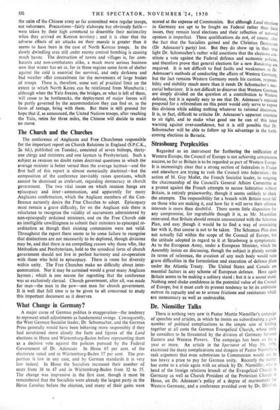• The Church and the Churches
The conference of Anglicans and Free Churchmen responsible for the important report on Church Relations in England (S.P.C.K., 2s. 6d.), published on Tuesday, consisted of seven bishops, thirty- one clergy and ministers and -one layman (a Presbyterian). Such a subject as reunion no doubt raises doctrinal questions in which the average minister is better versed than the average layman—and the first half of this report is almost esoterically doctrinal—but the composition of the conference inevitably raises questions, which cannot be dismissed as irrelevant, regarding democracy in church government. The two vital issues on which reunion hangs are episcopacy and inter - communion, and apparently for many Anglicans confirmation, which the Anglican members of the Con- ference earnestly desire the Free Churches to adopt. Episcopacy must remain a grave difficulty, for on the Anglican side there is reluctance to recognise the validity of sacraments administered by non-episcopally ordained ministers, and on the Free Church side an intelligible unwillingness to submit their ministers to episcopal re- ordination as though their existing commission were not valid. Throughout the report there seems to be some failure to recognise that distinctions are not necessarily to be deplored, though divisions may be, and that there is no compelling reason why those wfio, like Methodists and Presbyterians, hold to the synodical form of church government should not live in perfect harmony and co-operation with those who hold to episcopacy. There is room for diversity within unity. The Free Churches make no difficulty about inter- communion. Nor it may be surmised would a great many Anglican laymen ; which is one reason for regretting that the conference was so exclusively clerical. Church government, after all, was made for man—the man in the pew—not man for church government. It is well that full time is to be given to all concerned to study this important document as it deserves.














































































 Previous page
Previous page